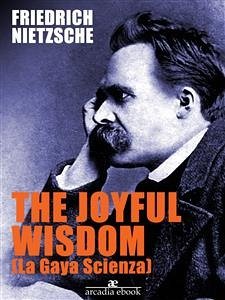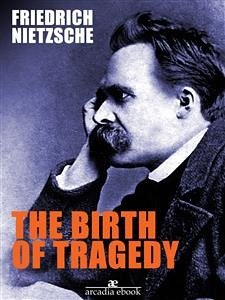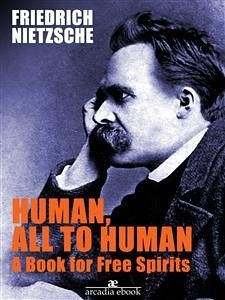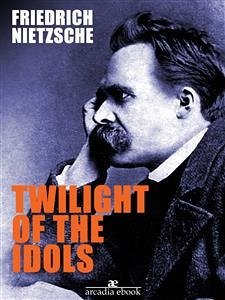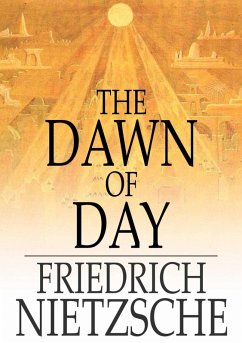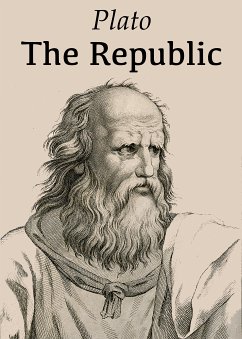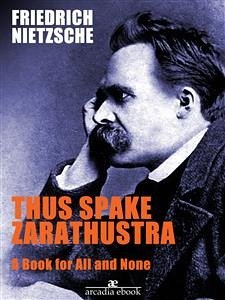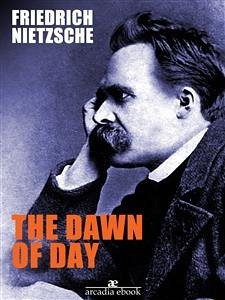
The Dawn of Day (eBook, ePUB)
Versandkostenfrei!
Sofort per Download lieferbar
0,99 €
inkl. MwSt.
Weitere Ausgaben:

PAYBACK Punkte
0 °P sammeln!
The Dawn of Day (German: Morgenröte - Gedanken über die moralischen Vorurteile; historical orthography: Morgenröthe - Gedanken über die moralischen Vorurtheile) is a 1881 book by the German philosopher Friedrich Nietzsche (also translated as "The Dawn" and Daybreak: Thoughts on the Prejudices of Morality).Nietzsche de-emphasizes the role of hedonism as a motivator and accentuates the role of a "feeling of power." His relativism, both moral and cultural, and his critique of Christianity also reaches greater maturity. In Daybreak Nietzsche devoted a lengthy passage to his criticism of Christ...
The Dawn of Day (German: Morgenröte - Gedanken über die moralischen Vorurteile; historical orthography: Morgenröthe - Gedanken über die moralischen Vorurtheile) is a 1881 book by the German philosopher Friedrich Nietzsche (also translated as "The Dawn" and Daybreak: Thoughts on the Prejudices of Morality).
Nietzsche de-emphasizes the role of hedonism as a motivator and accentuates the role of a "feeling of power." His relativism, both moral and cultural, and his critique of Christianity also reaches greater maturity. In Daybreak Nietzsche devoted a lengthy passage to his criticism of Christian biblical exegesis, including its arbitrary interpretation of objects and images in the Old Testament as prefigurements of Christ's crucifixion.
The polemical, antagonistic and informal style of this aphoristic book-when compared to Nietzsche's later treatments of morality-seems most of all to invite a particular experience. In this text Nietzsche was either not effective at, or not concerned with, persuading his readers to accept any specific point of view. Yet the discerning reader can note here the prefigurations of many of the ideas more fully developed in his later books. For example, the materialism espoused in this book might seem reducible to a naive scientific objectivism which reduces all phenomena to their natural, mechanical causes. Yet that is very traightforwardly not Nietzsche's strongest perspective, perhaps traditionally most well-expressed in The Gay Science.
Nietzsche de-emphasizes the role of hedonism as a motivator and accentuates the role of a "feeling of power." His relativism, both moral and cultural, and his critique of Christianity also reaches greater maturity. In Daybreak Nietzsche devoted a lengthy passage to his criticism of Christian biblical exegesis, including its arbitrary interpretation of objects and images in the Old Testament as prefigurements of Christ's crucifixion.
The polemical, antagonistic and informal style of this aphoristic book-when compared to Nietzsche's later treatments of morality-seems most of all to invite a particular experience. In this text Nietzsche was either not effective at, or not concerned with, persuading his readers to accept any specific point of view. Yet the discerning reader can note here the prefigurations of many of the ideas more fully developed in his later books. For example, the materialism espoused in this book might seem reducible to a naive scientific objectivism which reduces all phenomena to their natural, mechanical causes. Yet that is very traightforwardly not Nietzsche's strongest perspective, perhaps traditionally most well-expressed in The Gay Science.
Dieser Download kann aus rechtlichen Gründen nur mit Rechnungsadresse in A, B, BG, CY, CZ, D, DK, EW, E, FIN, F, GR, HR, H, IRL, I, LT, L, LR, M, NL, PL, P, R, S, SLO, SK ausgeliefert werden.




